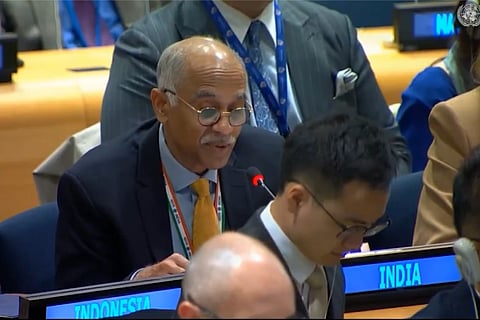

NEW DELHI: Highlighting the need for greater transparency in the operations of the UN Security Council's subsidiary bodies, India said that the reasons for rejecting or delaying requests to blacklist terrorist organisations are not disclosed publicly and remain confined to a select group of individuals, describing it as a “disguised veto.”
India’s Permanent Representative to the UN, P. Harish, speaking at the Inter-Governmental Negotiations Plenary on Working Methods on Thursday, also urged improved implementation of peacekeeping mandates.
“The demand in this Chamber for reforms is loud and clear. This call gains greater significance at a time when the world is expressing apprehensions at the ability of the United Nations to deliver, to meaningfully intervene on issues of key importance to humanity in different parts of the globe, particularly in the realm of peace and security – which remains the core mandate of the Council,” Harish said.
Citing a specific example of listing of terrorist outfits, he said: “while listing decisions are made public, details pertaining to rejection or putting on technical hold of listing requests are the exclusive preserve of a select few. This is indeed a disguised veto.”
India has consistently expressed concern over the functioning of the Council’s subsidiary bodies, such as the 1267 Al-Qaeda Sanctions Committee, particularly regarding how they handle requests to blacklist terrorist entities and individuals, especially the Pakistan-based terrorist outfits.
Indian grievance is that genuine, evidence-based listing proposals for globally sanctioned terrorists are blocked without giving any due justification that “smacks of double speak when it comes to the Council’s commitment in tackling the challenge of terrorism.”
In the past, the Council’s China, has placed holds and blocks on efforts by India to list Pakistan-based terrorists.
“We have had numerous discussions and debates. We speak passionately but we continue to be where we are,” the Indian envoy said. Calling on the UN membership to act on the long-delayed UNSC reforms, Harish said Member States cannot be “losing anymore time in exchanging ideas and engaging in discussions alone.”
“It is time to move forward. It is time to show results,” he said. Reiterating that the world does not have the luxury to hide behind the smokescreen of the Intergovernmental Negotiations, a process which has no time frame, and no text to achieve real reforms, India underscored that the pathway to reforms starts with a text, and attaching fixed timelines to achieving concrete outcomes.
“May I add, that the reform of the working methods of the IGN process itself, is thus a very good starting point,” he said. On implementation of peacekeeping mandates, Harsh said these should duly factor in the concerns of the troop and police contributing countries.
“For India, as the largest cumulative troop contributor, this remains a key issue,” he said. Harish further stressed that reforms pertaining to one cluster cannot be considered in isolation. “A piecemeal approach is bound to fail. Therefore, the question of Council reforms needs to be dealt with in its entirety, in a holistic manner,” he said.